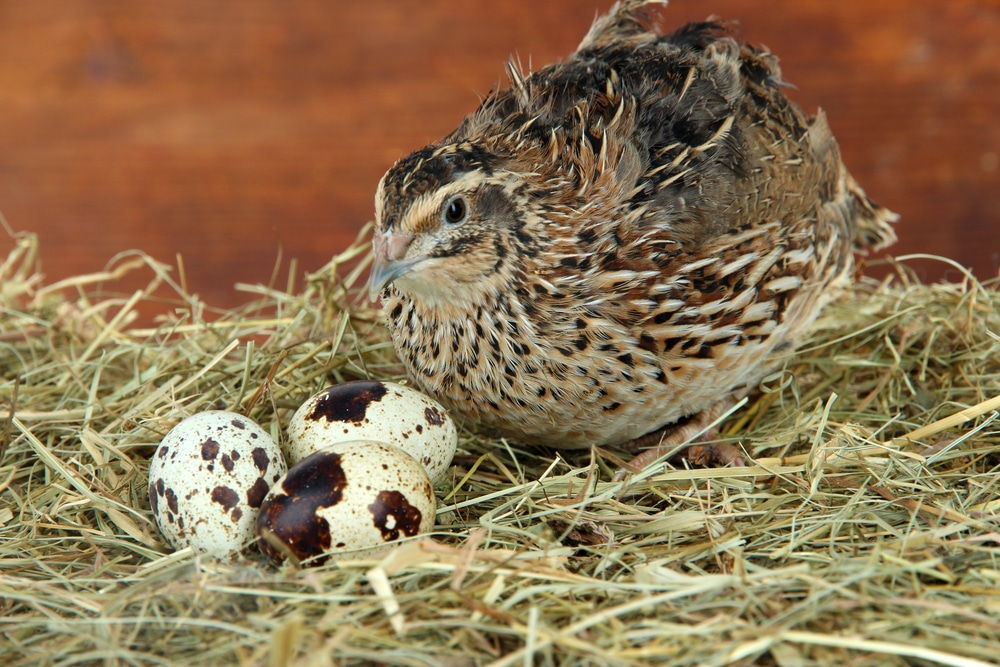Move aside, chicken. You’re not the only bird that produces delicious, nutritious eggs for the breakfast table. We’re not talking about ducks, either. Quail eggs are a delicacy that more people should consider.
Although chicken and duck eggs are often regarded as the most popular breakfast proteins, quail eggs deserve a spot at your next brunch.
Best Species of Quail for Eggs
There are several species of quail to consider if you want to produce quail eggs on your farm. Here are a few breeds to consider:
- Eastern bobwhite
- Coturnix
- Button quail
- Japanese quail
The Eastern bobwhite is the most popular species of “domestic” quail in the United States, but another popular option is the Coturnix.
Both are excellent breeds for beginners and the eggs and egg production will be roughly the same with both breeds. However, if you want to also raise quail for meat, you might want to consider the Coturnix, as it’s a good meat bird.
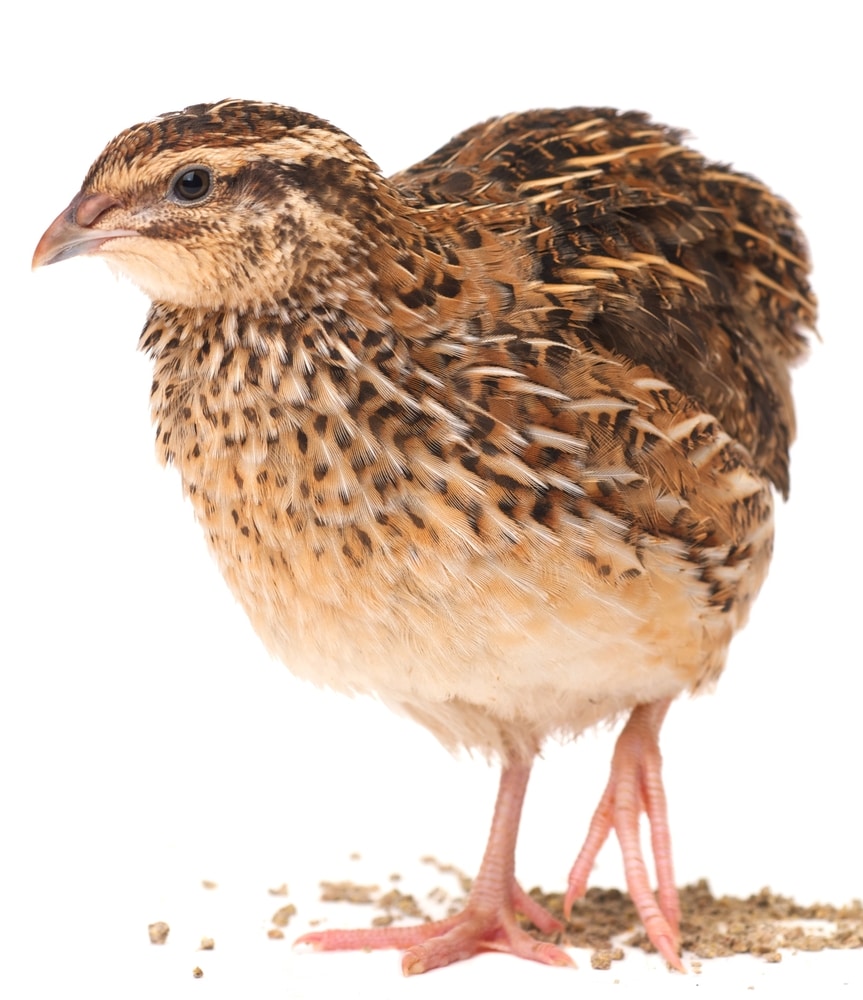
You can also raise Button Quail. These quail do produce eggs, but they are so tiny that you likely will have a hard time making a meal out of them.
If you really want to up the ante when it comes to egg production, you should consider the Japanese quail. This bird looks a lot like the Coturnix but starts laying eggs at around six weeks of age.
These birds have relatively long lifespans, with the ability to live up to two years in captivity, and they’ll give you around 200 eggs per year in this timespan, too.
When you’re ready to get started raising quail, you can either purchase fertilized eggs that you can then hatch in an incubator, or you can purchase day-old chicks, also known as cheepers.
Quail Egg Size and Appearance
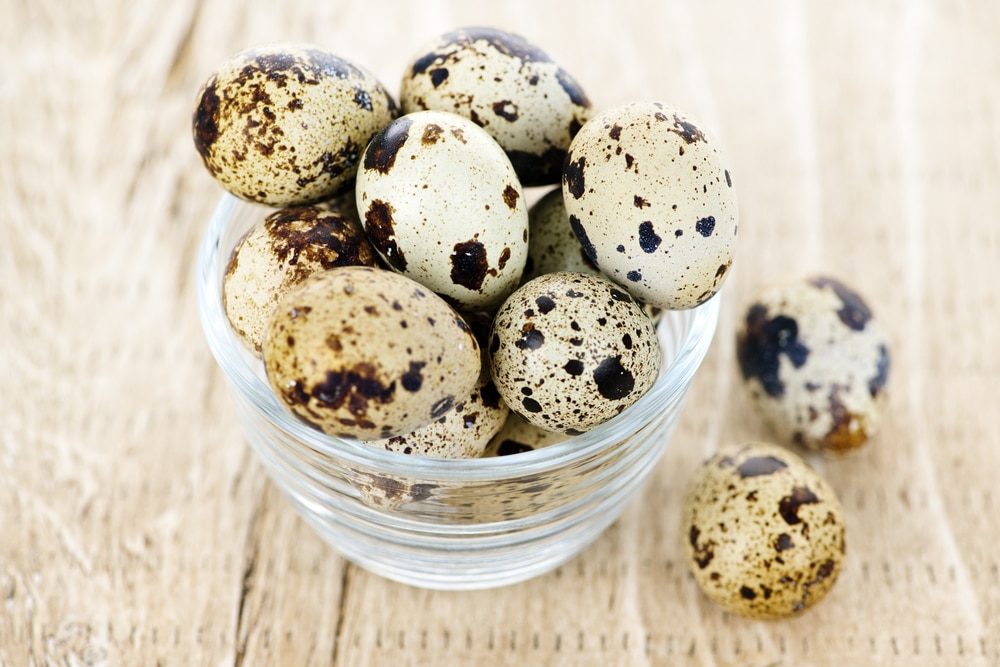
A quail egg is roughly a fifth of the size of a chicken egg. It has a brown spotted shell. These cut speckled eggs look a lot like the malted milk balls that you can purchase in stores around Easter time.
Quail eggs are incredibly small. If you put a quail egg next to a duck egg, in fact, it will look like a miniature jelly bean! That’s even truer if you are raising Button quail, who produce even smaller eggs.
Otherwise, a quail egg looks much like a chicken egg or duck egg, minus the speckles. They are usually cream-colored and have a variety of spots and speckles. They look much like chicken eggs except and have an identical shape and form but, again, they are much smaller.
One quail will lay between 150 and 300 eggs each year – or on average, an egg every other day or so. Some lay more often than that.
What Do Quail Eggs Taste Like?
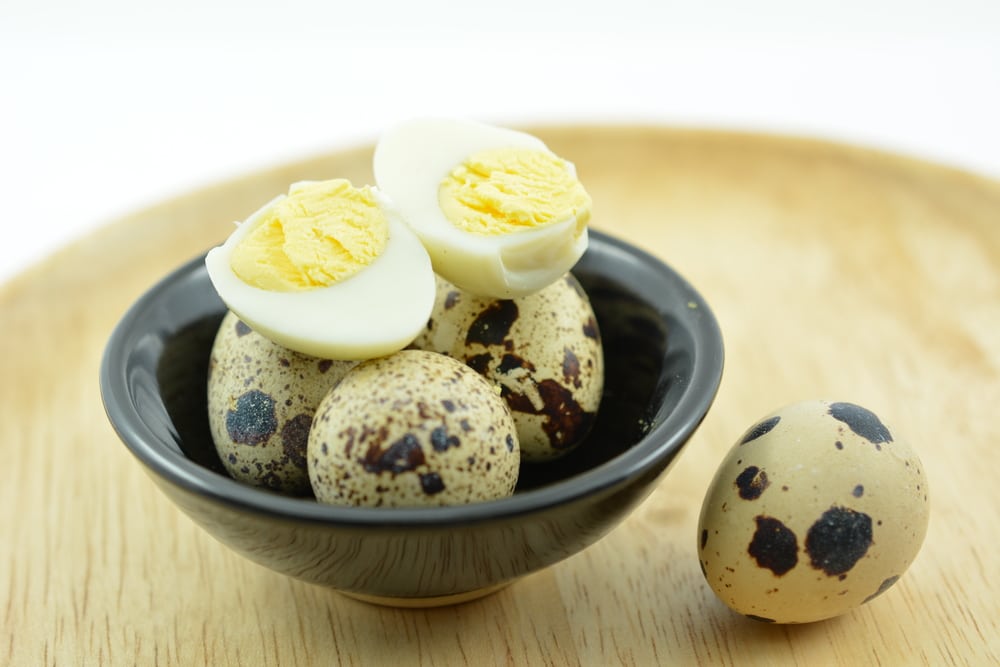
Many people assume that quail, duck, and chicken eggs all taste quite different. However, the reality is that the three are actually quite similar, and if you were given a blind taste test, you likely wouldn’t know which was which.
Yet, there are some subtle differences. Although many people argue that quail eggs taste gamey, this is not the case. The real difference is in the consistency of the egg. Like the eggs of Guinea hens, quail eggs have more yolk than they do whites. Therefore, the eggs are thicker and creamier, making them ideal ingredients in rich, succulent recipes.
Quail eggs tend to be a bit lighter, though, than duck eggs, which are preferred over chicken eggs for baking. Trust us, once you give quail eggs a try, you won’t ever want to go back to store-bought chicken eggs!
What Are the Benefits of Quail Eggs?
Despite their small size, quail eggs have a ton of benefits. Here’s an overview of the pros:
- High in vitamin B12
- High in protein
- Improves digestion
- Benefits the respiratory system
- Benefits the nervous system
- Packed with vitamins and minerals
- May help combat allergies
- Improves the production of red blood cells
- Contains anti-salmonella antibiotics
Regardless of their diminutive stature, quail eggs are higher than chicken eggs in both vitamin B12 and protein. They are higher in cholesterol, since they have more yolk than egg, but this kind of cholesterol is thought to be the “good” kind and shouldn’t do you much harm.
That being said, the cholesterol levels in a quail egg is not negligible. In just one egg, there is about 75 milligrams of cholesterol, which is nearly a quarter of your recommended daily value.
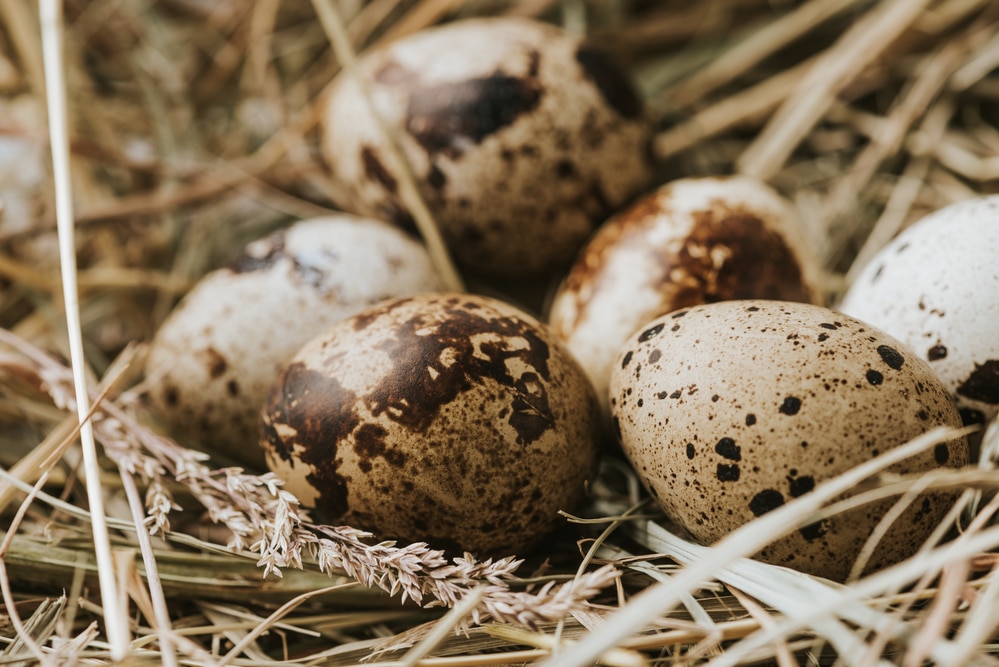
Quail eggs are believed to improve your nervous,respiratory, and digestive functioning since they have so many vitamins. They are also believed to have antioxidant properties that can help flush harmful toxins from your body.
One quail egg – which will usually weigh around nine grams – comes in at just 14 calories and has one gram of protein. It has one gram of fat and high levels of vitamins and minerals like vitamin A, iron, selenium, choline, and riboflavin.
In fact, if you eat five quail eggs, you’ll get 20% of your daily recommended riboflavin and 10% of your B12. These nutrients aren’t found in large quantities in other foods, so these teeny-tiny eggs are quite impressive.
If you’re anemic, quail eggs are a smart choice. These eggs have twice as much iron as chicken eggs, so they can increase the formation of red blood cells. There are some studies that suggest that eating quail eggs may help combat allergies based on the unique structure of the cells in the eggs.
Interestingly, quail eggs are being studied as a treatment for salmonella infection. Unlike chicken eggs, which are known carriers of salmonella bacteria, a quail egg contains unique anti-salmonella antibiotics.
Who Should Not Eat Quail Eggs?
While quail eggs are delicious, nutritious foods for most people, there are some individuals who should steer clear of quail eggs.
For example, pregnant women along with those with compromised immune systems should not eat quail eggs unless they are completed cooked.
There should be no runny yolk, which will reduce the likelihood of contamination.
Unfortunately, if you’re allergic to chicken eggs, you should probably steer clear of quail eggs.
It’s very difficult for doctors to test a quail egg allergy, since it’s so rare, so you might want to avoid eating them if you know you can’t eat regular eggs.
How to Cook and Eat Quail Eggs
Don’t worry – if you know how to cook chicken eggs, you probably know how to cook quail eggs, too. Just bear in mind that the ratios will be a bit different. For every chicken egg called for in a recipe, you’ll need at least three quail eggs.
If you really want to be precise, just use a food scale to make sure your recipe has the right amount of egg.
Even more so than calculating ratios, the biggest challenge that most people encounter when cooking with quail eggs is that they can be incredibly difficult to crack. The shells are firmer than those of duck or chicken eggs, so you won’t be able to crack the egg by tapping it on the side of a bowl. Instead, you’ll have to use a knife to literally cut off the top of the egg.
You can use a regular serrated knife, but if you plan on cooking with quail eggs regularly, you may want to invest in special quail egg scissors. These work just like knives but are much easier to use.
On the flip side, though, it takes much less time to boil quail eggs than it does chicken eggs. You only need to boil them for two minutes before removing them from the hot water and running them under a cold tap.
Hard-boiled quail eggs can be tougher to peel than chicken eggs. However, although the shell is harder, the membrane will be easier to handle. Hard-boiled quail eggs taste great in salads or sandwiches.
You can also use quail eggs in baking. If you used a lot of quail eggs in a recipe, you might want to add a few minutes to the timer for the recipe, even if you adjusted the number of quail eggs for chicken eggs. This is because there will be a higher balance of yolks versus eggs, which can take longer to cook.
If you’re unsure where to start, check out some quail egg recipes for ideas.
How Long Does it Take for a Quail to Lay Eggs?
Female quails can begin laying eggs between the ages of two and eight months. If you’re familiar with raising chickens, you know that is much earlier than the average chicken – the “early bloomers” when it comes to chicken breeds, by comparison, don’t start laying until about fifteen or sixteen weeks of age.
Although quail start laying eggs much sooner than chickens or other poultry breeds, they, unfortunately, don’t lay eggs quite as long. They usually drop off in production after nine months, and most quail only live for about one year in captivity. There are some quail, however, that can live for about two years.
While your egg production will be higher – we’re talking an egg a day or an egg every other day for most quail – again, you will need more quail eggs to make up a single chicken egg. Plus, you won’t have your quail around for quite as long.
How to Improve Quail Egg Production
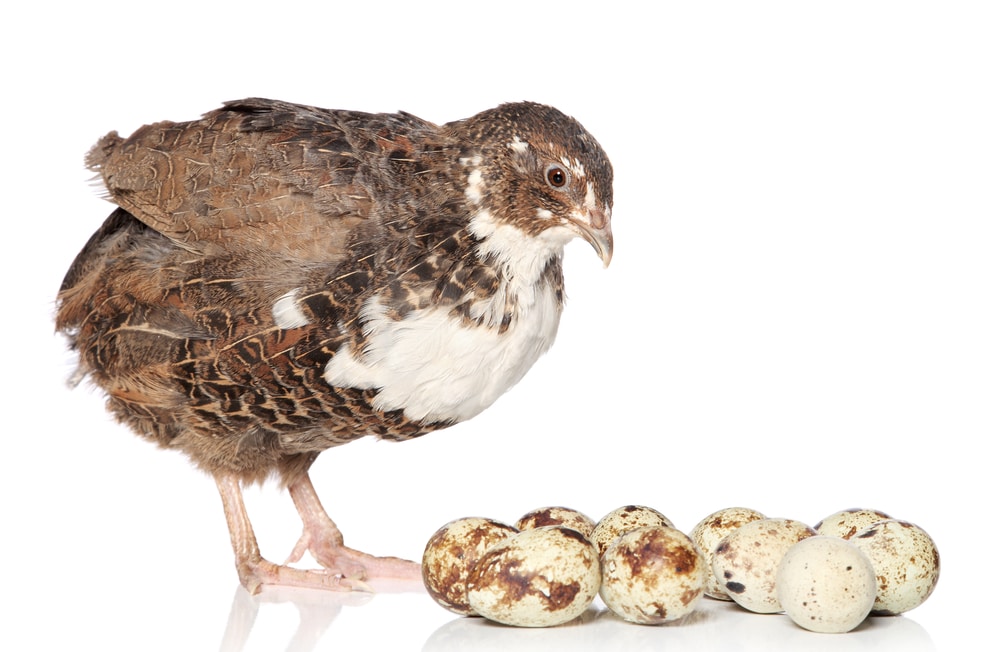
To improve the egg production of your quail, there are a few simple steps you can take. Many of these are similar steps that are necessary to improve egg production in chickens and ducks, too.
For example, your quail should be well-fed. There are plenty of commercial quail feeds on the market, but even a simple game bird feed should provide your birds with all the nutrients they need to lay ample amounts of eggs.
In addition, your quail should receive at least 14 to 16 hours of sunlight each day. While this sounds like a lot, remember that quail do not lay as long as chickens and can, therefore, be raised during the brightest periods of the year (as opposed to the dark days of fall, winter, and early spring).
How to Gather Quail Eggs
Quail are pretty simple creatures. Like ducks, quail prefer to nest on the ground. If you’re used to raising chickens, this is something that might take some getting used to.
Quail would rather lay their eggs on the ground, among the grass and dirt, than in a nesting box. While you can build a nesting box to entice them to lay, it’s probably not going to have much of an effect if you set it up just like your chickens’ nesting box.
Instead, just put a nesting box on the ground or perhaps just lay out a bit of straw. This will help them feel warm and at home. However, you don’t need to feel obligated to do this. If your quail don’t have a nesting box to call their own, they will simply lay their eggs whenever and wherever the mood strikes them.
If you raise your quail in a standard cage, you can buy a cage that comes with a built-in slanted tray. This will enable the eggs to roll down and out of the cage. The tray will prevent the eggs from becoming soiled and stepped on.
However, if you let your quail free-range, collecting eggs can be a bit more difficult. If you have quail that are relatively cultivated and orderly, they may lay in the nesting spots that you have provided for them – but this isn’t something you should count on.
When egg collection time rolls around, check quiet areas of the property that are grassy or filled with straw. This is usually where you’ll find quail eggs, especially if your females are feeling broody.
What to Feed Quail for Good Egg Production
You are what you eat, right? There is perhaps no other situation in which that is more true than in raising poultry for egg production.
Quail will get the majority of their nutrients from seeds and grains. However, they will also eat sources of protein like grubs and bugs. Therefore, it’s always best to free-range your quail if you can, even if it’s just for a few hours a day. That way, the eggs will taste better and be richer in nutrients.
As with chicken eggs, you’ll usually be able to tell the difference in quail eggs based on what the quail were fed. Free-range quail usually produce eggs that have bright orange yolks with more intense flavors.
Raising Quail
Quail aren’t the first birds you think of when you consider raising poultry for your farm, but these game birds are definitely worth the consideration. Not only are quail eggs fun to hatch, but these unconventional fowl require less space than other types of poultry. Since they’re so small, they also eat less than chickens, too.
Quail are often viewed as a more economical choice of poultry than chickens because they lay an egg each day – or almost every day. Although the eggs are smaller, they are also much rarer than chicken eggs. Therefore, you can often make a premium by selling the eggs to your friends and neighbors.
Another benefit to raising quail? They are quiet. Unlike roosters, male quail are not known for making a morning serenade to the sun. Quail have their own distinct calls, for sure, but these are usually quieter and much more like the calls of songbirds.
If you’re looking for a chicken species similar to a quail, consider buying some of the smallest chicken breeds.
Enclosure Requirements
Quail enclosures have to be super secure since these birds can fly. Because of their size, they tend to be vulnerable to predators, and they’re also more likely to suffer from avian diseases.
Yet, raising quail is nonetheless quite a simple task. All you will need is a proper enclosure with a sleeping area and a covered run. You’ll also need nesting boxes for the eggs along with feeders and waterers.
As previously mentioned, quail don’t need a ton of space – usually, only about one square foot per bird, which is about a quarter of what the average chicken requires. Again, though, the housing needs to be fully contained. If you’re raising your quail for eggs, you will want to control the temperatures and light conditions for the best production.
Depending on where you live, you might have to obtain a permit to raise your quail covey from the local department of fish and game.
Before you commit to raising quail, be sure to research all the quail care requirements.
Can You Sell Quail Eggs?
Many people sell quail eggs, and in most cases, this is perfectly legal. However, you are going to want to research the regulations in your areas. Some states have licenses and permits required to sell quail eggs. These restrictions often don’t apply to chicken eggs, so if you’ve sold chicken eggs in the past, don’t think you’re automatically covered.
Otherwise, know that in many cases, you will be able to sell quail eggs to individuals, at farmers’ markets, to restaurants, or even to some grocery stores. Often, you can charge a premium for these eggs, since they are considered quite rare.
Frequently Asked Questions
If you have an interest in quail eggs, there’s probably a lot you’re curious about. So, here are some questions many people wonder.
How Much Do Quail Eggs Cost?
You can buy quail eggs for $3 to $6 a dozen. So, they aren’t much more expensive than chicken eggs.
How Many Quail Eggs Equal a Chicken Egg?
Three to four quail eggs are the equivalent to one chicken egg. Quail eggs have a comparable nutritional value to chicken eggs, but they’re smaller, so you can eat more of them daily.
What Happens if You Eat Too Many Quail Eggs?
If you eat too many quail eggs, you might experience lowered blood sugar, raised cholesterol, and digestive problems. Those symptoms are unlikely to occur unless you eat more than eight in one day. There are no known side effects of eating only a few of these eggs per day.
The Bottom Line: Are Quail Eggs Worth It?
Quail eggs are an excellent alternative to chicken eggs, with some containing more nutrients in a smaller package. If you want to make the most of your morning meal, choose quail eggs.
Plus, these birds aren’t too challenging to raise, either, if you want to have some in your own backyard. They’re so small that some people can even raise them indoors, and while the care requirements differ slightly from what you would need to do if you were raising chickens, it’s not a difficult endeavor in thes lightest.
If you haven’t tried quail eggs, be sure to add them to your breakfast rotation today – and get a few quail to add to your backyard covey while you’re at it, too!
